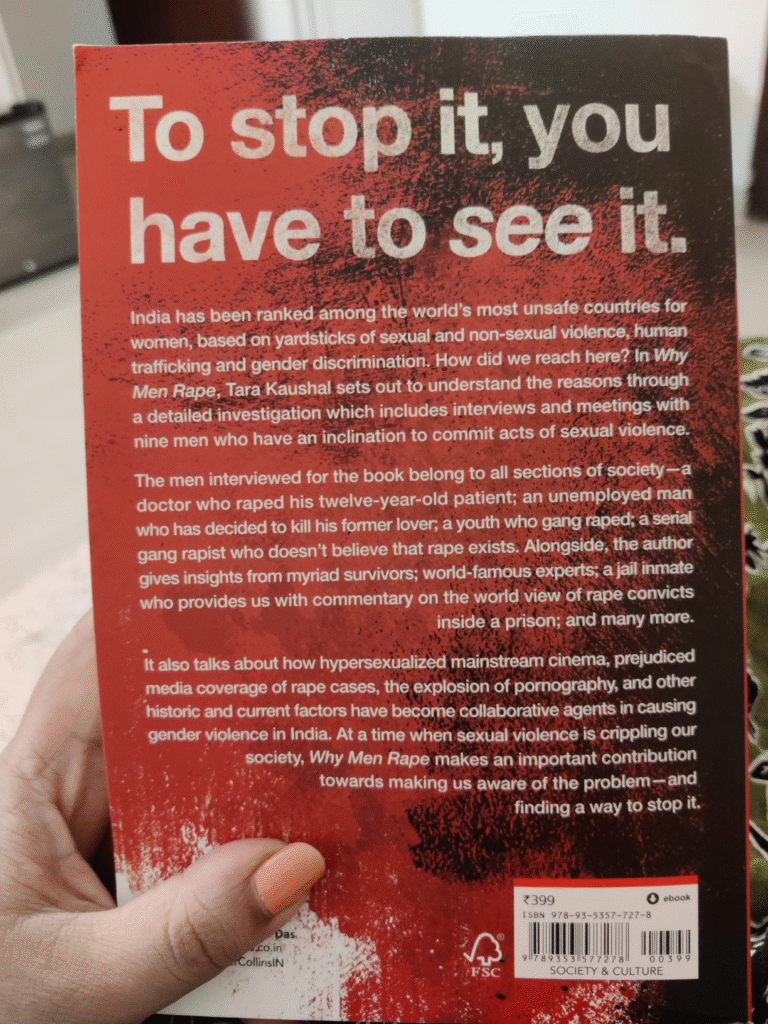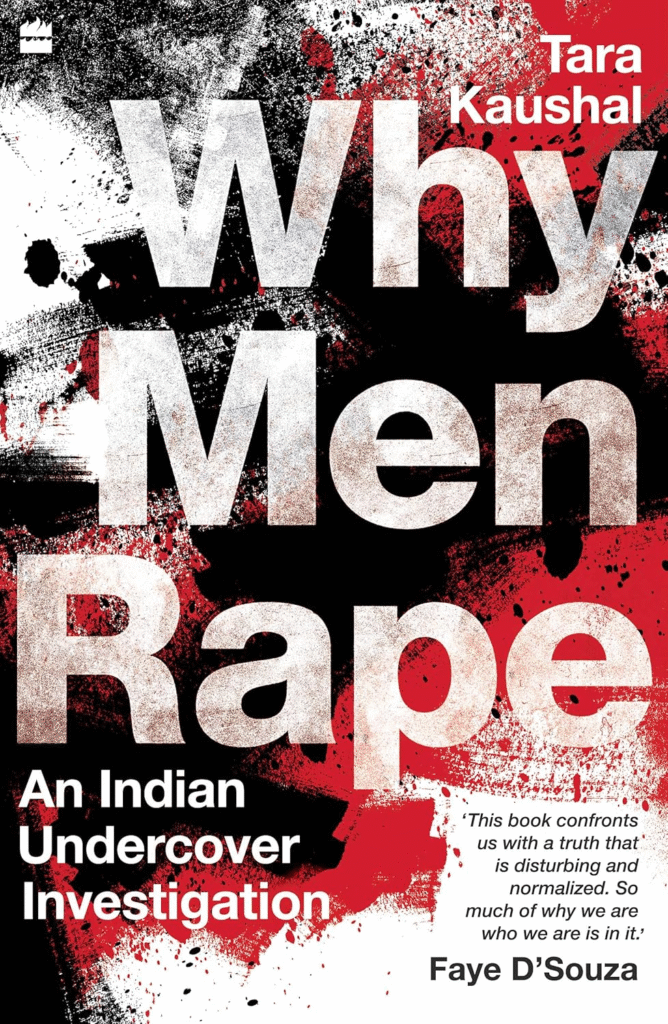Why Men Rape by Tara Kaushal, published on 30 June 2020, is a groundbreaking exploration of the reasons behind sexual violence. In this book, the author undertakes an extraordinary journalistic journey, to conduct in-depth research by interviewing nine convicts who committed sexual violence, using a qualitative and socio-anthropological approach to understand their mindsets and the factors contributing to rape culture in India. She asks them 250 thought-provoking questions to understand their perspectives, motivations, and backgrounds.
In Why Men Rape, the author discusses various reasons behind why men commit rape, such as patriarchy, misogyny, narcissism, child sexual abuse, poverty, power dynamics, societal influences, upbringing, domestic violence, orthodoxy, religion, lust, and revenge. The book highlights how these issues are deeply embedded in our systems, making it seem almost impossible to eliminate them. However, it stresses the importance of trying to address these problems and work toward a solution.

Through Why Men Rape, Tara Kaushal combines her personal observations with extensive research on global issues like gender, sexuality, and privilege. The book delves into the minds of perpetrators from various sections of society, shedding light on their justifications and beliefs. While the primary focus is on societal factors contributing to rape culture, the author also touches upon survivor experiences and expert insights.
In Why Men Rape, Tara Kaushal investigates the reasons behind sexual violence by interviewing nine men who have committed such acts. These men come from different backgrounds, including a doctor who raped a twelve-year-old, an unemployed youth who killed his ex-girlfriend, and a gang rapist who denies the existence of rape. The book also includes insights from survivors, experts, and a jail inmate who shares observations about rapists’ mindsets. At a time when sexual violence is a pressing issue, this book aims to raise awareness and explore ways to prevent it.
This 250-page work stands as an essential read for those seeking to understand patriarchy, sexual violence, and the failure of systems to address these issues. Why Men Rape offers a mirror for society, encouraging reflection and change, making it an invaluable resource for young readers, men, and anyone striving for a more equitable world.
Availability & Detail of book
Why Men Rape: An Indian Undercover Investigation by Tara Kaushal is published by HarperCollins (1st edition, 30 June 2020). The book is written in English and has 326 pages. It is available in paperback for ₹395 and as a Kindle e-book for ₹335. A Kindle edition is convenient, portable, and often more affordable than a physical book. You can buy it on Amazon India, Flipkart, or HarperCollins’ official website. The book investigates the causes of rape culture in India through interviews with rapists and explores the social and cultural factors behind this issue.

About Author of Why Men Rape
Tara Kaushal is a Mumbai-based writer and media consultant renowned for her work on gender, sexuality, equal rights, and sociocultural issues. She earned a BA Honours in English with a specialization in feminism from Jesus and Mary College, New Delhi, in 2004, and later completed her Master’s in English from Mumbai University, focusing on gender and post-colonial literature.
Throughout her career, Kaushal has contributed to various esteemed publications, including Tehelka, DNA, Man’s World, The Week, Firstpost, Elle, Harper’s Bazaar, and Governance Now. Her writing often delves into complex sociocultural topics, aiming to make them accessible and engaging for a broad audience.
In recognition of her gender-sensitive writing, she received the Laadli Media Award in 2013-2014. Additionally, she was honoured as one of Femina’s Superwomen of the Year in 2018.
Kaushal is the author of Why Men Rape: An Indian Undercover Investigation, published by HarperCollins in June 2020. This work is part of a larger multimedia project, Why Men Rape, which includes books, a documentary, and an active online presence, reflecting her commitment to gender journalism and activism.
Beyond writing, she has co-created the art-activism project BeautyFull alongside photographer Sahil Mane. Kaushal is also recognized as a public intellectual in the fields of gender, sexuality, sociocultural issues, and gender violence. She has appeared on various news platforms, including CNN News18, NDTV, Times Now, and Mirror Now, and has been featured in publications such as Mumbai Mirror, Mid-Day, Outlook, The Wire, and DNA. Her dedication to exploring and addressing critical social issues continues to influence discussions on gender and human rights in India and beyond.
Themes Explored in Why Men Rape
- Understanding Rape Culture: Why Men Rape provides an in-depth exploration of the concept of rape culture. It examines how societal norms, patriarchy, and power dynamics normalize sexual violence against women. The book highlights the “rajabeta syndrome,” where societal privilege given to men fosters entitlement. By addressing issues such as marital rape, child marriage, and gender inequality, Why Men Rape forces readers to question sociocultural norms and recognize how deeply ingrained attitudes perpetuate sexual violence.
- Patriarchy and Masculinity: A major theme in Why Men Rape is how patriarchy shapes male identities and behaviours. The book explains how men are conditioned to see themselves as dominant and women as subordinate. Kaushal links patriarchal norms to the use of power, anger, and sexuality in acts of rape. Through interviews, she reveals how these beliefs transcend education, social class, and geography, making patriarchy a universal factor in rape culture.
- The Psychology of Perpetrators: Tara Kaushal delves into the psychological motivations of rapists. By interviewing nine men from various backgrounds, Why Men Rape uncovers the mindset of perpetrators, exploring how power, anger, and a distorted sense of sexuality drive their actions. The book sheds light on individual factors like childhood trauma, lack of empathy, and toxic masculinity that contribute to violent behaviour.
- Socioeconomic and Cultural Factors: The book emphasizes the role of socioeconomic and cultural influences in shaping rape culture. Kaushal discusses how caste, religion, and social class intersect with sexual violence. Why Men Rape also critiques cultural practices like arranged marriages, lack of sex education, and the normalization of porn, showing their impact on attitudes toward consent and gender roles.
- Gender Inequality and Feminism: A recurring theme in Why Men Rape is the fight for gender equality and the true meaning of feminism. Kaushal asserts that feminism is not a battle between genders but a fight against patriarchal ideologies. The book highlights how improving women’s rights often leads to backlash, with violence against women increasing as they gain independence.
- Impact of Media and Entertainment and Technology: The book discusses the influence of media and technology in spreading harmful gender norms. Kaushal argues that these factors reinforce rape culture and desensitize people to violence. Why Men Rape critically addresses the influence of media, particularly Bollywood, in perpetuating harmful stereotypes about women. The hyper-sexualization of women and the glamorization of toxic masculinity in movies and music reinforce the objectification of women’s bodies. Kaushal also highlights how the availability of violent pornography influences attitudes toward sexual violence. This theme shows how mass media and entertainment indirectly cultivate rape culture.
- Intersectionality and Broader Issues: The book also connects rape to broader societal issues like caste-based discrimination, child abuse, child marriage, and societal inequalityand the lack of support for male survivors. By addressing these intersections, Why Men Rape provides a more comprehensive understanding of sexual violence and its roots in systemic oppression. Kaushal discusses how these factors intersect with and exacerbate rape culture in India. For example, lower-caste women are disproportionately targeted, showing how sexual violence is also a tool of systemic oppression.
- Representation of Rape Culture in Indian Society: The book explores how rape culture thrives in Indian society, touching on issues such as marital rape (which many still deny exists), gang rapes, child sexual abuse, and domestic violence. Through interviews with nine men who represent different facets of rape culture, Why Men Rape reveals the deeply misogynistic beliefs that normalize these crimes. The author examines how societal norms and familial structures, especially in misogynistic Indian households, perpetuate violence against women.
- Perpetrator Mindsets and Denial of Crime: The interviews in Why Men Rape reveal that many perpetrators do not see their actions as crimes. The book highlights the disturbing justifications rapists give for their actions, from blaming women to claiming ignorance of the concept of consent. This theme sheds light on how cultural conditioning fosters denial and lack of accountability among offenders.
- Power Dynamics and Anger as Root Causes: Kaushal delves into how power and anger play pivotal roles in sexual violence. The book explains how men are conditioned to seek dominance over women, using violence to assert control. It also discusses the use of women’s bodies as tools for revenge, reflecting how patriarchal power structures dehumanize women. Why Men Rape shows how these dynamics create a dangerous environment where sexual violence is used as a tool of oppression.
- Hyper-Sexualization and Lack of Sex Education: Kaushal explores how the lack of comprehensive sex education in India contributes to ignorance about consent and healthy relationships. Combined with the hyper-sexualization of women in media and unchecked access to pornography, this creates a distorted understanding of sexuality and relationships. Why Men Rape emphasizes the urgent need for education reform to address these issues.
- Critique of Justice and Law Enforcement: Why Men Rape critiques the shortcomings of the justice system and law enforcement in addressing rape cases. From victim-blaming to the reluctance of police to file cases, the book highlights how systemic failures contribute to the prevalence of rape. Kaushal argues that punitive measures alone are insufficient and calls for structural reforms to address root causes.Kaushal explores how legal systems and societal structures fail to address the root causes of rape. Why Men Rape points out issues like low conviction rates, lack of police sensitivity, and societal victim-blaming, emphasizing the need for systemic reforms.
- Role of Social Movements: The book acknowledges the significance of movements like #MeToo in breaking the silence around sexual violence. However, Why Men Rape also critiques how such movements are often dismissed or misunderstood in patriarchal societies. The book advocates for collective action to challenge and dismantle rape culture.
- Reflections on Feminism and Human Rights: Kaushal presents feminism as a fight against patriarchal ideologies rather than a battle between genders. The book argues that true gender equality is rooted in human rights and universal love. While acknowledging the challenges in achieving this ideal, Why Men Rape calls for societal introspection and cultural change to address the underlying causes of sexual violence.
- Proposed Solutions and Limitations: In the final chapters, Why Men Rape proposes solutions like promoting universal love, human rights, and egalitarian values. However, the book acknowledges the challenges of achieving these ideals in deeply patriarchal societies. Critics of the book note the lack of practical, actionable strategies, which leaves room for further discussion on addressing rape culture effectively.
By weaving these themes together, Why Men Rape offers a comprehensive analysis of the factors perpetuating rape culture in India and beyond. The book serves as both a wake-up call and a resource for understanding and combating sexual violence. Why Men Rape is a bold and necessary investigation into the multifaceted causes of rape, offering a mirror for society to reflect upon and urging readers to challenge existing norms. The book serves as a steppingstone for further research and action on this critical issue.
Excerpts from the Book
- From a patriarchal perspective, rape is a crime against the ‘owner’ of the woman—with her ‘honour’ sullied, her ‘virginity’ robbed, the goods spoilt.
This line highlights how patriarchal systems often view women as property rather than individuals. In such a mindset, a woman’s worth is tied to her “honour” and “virginity,” which are seen as assets belonging to her family or husband. When sexual violence occurs, it is framed not as a crime against the woman herself but as a violation of the “owner’s” rights, reducing her humanity to a commodity. This perspective reinforces harmful gender norms, perpetuating the control of women’s bodies and agency.
- French parents believe that hearing the word ‘no’ rescues children from the ‘tyranny of their own desires.’
This line suggests that French parents see saying “no” as an important part of raising children. They believe it helps children learn self-control and prevents them from being ruled by their own wants and impulses. By hearing “no,” children understand limits and develop a healthier relationship with discipline and boundaries.
Why You Should Buy and Read: Why Men Rape
Why Men Rape is essential reading for anyone looking to understand the complex issues surrounding sexual violence. Through undercover interviews with nine accused rapists, the author uncovers their motivations and the societal influences that shape their actions. The book presents both familiar concepts, like the use of rape as a means of asserting power, and surprising insights, such as the link between childhood abuse and becoming a perpetrator. By exploring these themes, the author helps readers reflect on the systemic problems within society and encourages a deeper examination of our attitudes towards rape. This thought-provoking approach makes the book a valuable resource for fostering awareness and promoting meaningful conversations about prevention. This book issuitable for anyone interested in understanding the complexities of sexual violence, including students, educators, activists, and general readers seeking insight into societal issues.
Final Thoughts
Why Men Rape is not just a book about the perpetrators of sexual violence; it is a call to action for society. Tara Kaushal’s investigative approach invites readers to confront uncomfortable truths about the roots of rape culture, challenging them to look beyond anger and seek understanding. By humanizing the accused while also acknowledging their crimes, the book emphasizes the complexity of this issue and the necessity of addressing systemic factors that enable such behaviour. Kaushal’s work ultimately serves as a catalyst for discussion and reflection, encouraging readers to engage in conversations that could lead to a more informed and empathetic society. It reminds us that understanding the motivations behind these actions is a vital step toward preventing future violence and fostering a culture of respect and accountability.




